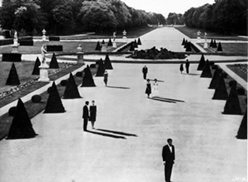Is It Really a Great Movie? Part Thirty-One: Last Year at Marienbad
by dan heaton
Using Roger Ebert's Great Movies book as a guide, this series of articles will focus on all films included on his list that previously have escaped my notice. Since all lists are subjective, I am not treating Ebert's choices as the essential selection of films. However, his essays offer the perfect chance for me to explore both classics and lesser-known pictures from around the globe.

French director Alain Resnaisí films are not for the weekend multiplex crowd and often confuse even discerning viewers. He uses a deliberate pace and unique editing tools that continually challenge you to stay with him. Resnaisí unconventional work places him within the French New Wave, a group of filmmakers like Goddard and Truffaut who aimed to reject the typical narrative standards. Last Year at Marienbad is one of his most highly regarded pictures, though it is largely unknown beyond circles of critics and film lovers. Released in 1961, this complex film was nominated for the Best Original Screenplay Oscar and won the Golden Lion at the Venice Film Festival. A Fox Lorber DVD release appeared in 1999, but it is now out of print and unavailable through Netflix. I was lucky enough to locate a copy at a nearby library. Knowing little about this picture, I quickly grew lost within the convoluted plot structure.
The basic story is difficult to describe because weíre not given a clear picture of what actually occurs. The apparent events take place at an upper-class hotel where impassive onlookers view some type of performance. Afterwards, a man (known as X) introduces himself to an attractive woman (known as A) and tells her they met a year earlier. Heís not even sure of the site, though it might have been Marienbad. She doesnít seem to remember their meeting, but continues to speak with him and might be purposely denying an actual event. Thereís also a creepy guy (known as M) who follows them around but says little. Is he her husband, or just a strange stalker? A loose collection of flashbacks appear to explain their original meeting, but X keeps changing his story. Are these discrepancies due to a cloudy memory, or is he making things up as he goes along? A conveys little interest while X tries repeatedly to prove they shared a brief love. The settings change repeatedly, moving indoors and outdoors, and an aura of confusion pervades the entire discussion. As he drones on for lengthy periods about their previous connection, it becomes hard to believe that anything is real anymore.
Film experts have undoubtedly spent countless hours dissecting each scene and have developed some clear solutions. Unfortunately, itís fairly easy to poke holes in almost any interpretation because Resnais jumps so frequently into fresh territory. He also employs surrealistic tactics where characters step into new areas with each move. Sometimes X and A interact from a variety of locations within a single conversation. Weíll see M walking through the chateau while the others view him in a different place. The entire picture is tough to follow and does offer an interesting exploration of memory, but itís undercut by too much droning from Giorgio Albertazziís X. He may look a bit like Gary Cooper, but this guy is definitely not the strong, silent type. His creepy advances on A might be warranted, but they grow tiresome as he speaks incessantly. Looking like a young Martin Landau, Sacha PitoŽffís M looms over every moment and is more effective as the cold figure. We never learn his true identity, but he definitely inspires a fearful reaction. She consistently changes moods (and clothes) and is almost impossible to read, which makes our understanding even more difficult.
Last Year at Marienbad is the type of baffling intellectual picture that invites ridicule. Roger Ebert acknowledges this fact but is fascinated by the many layers present within Resnaisí creation. While viewing this film, I was often frustrated by the lengthy narration from X that made little sense. However, its effect has remained with me longer than some more-digestible fare. Does that make it a Great Movie? Not for me. I canít disagree with viewers who watch it repeatedly and hope to discover its meaning. The photography is definitely beautiful and itís easy to become immersed in the grand exterior shots. However, thereís not enough within these characters to warrant this exalted status. I wanted to become more involved in their mysteries but found myself lost within the impenetrable structure.
Copyright (c) 2007 erasing clouds |
|